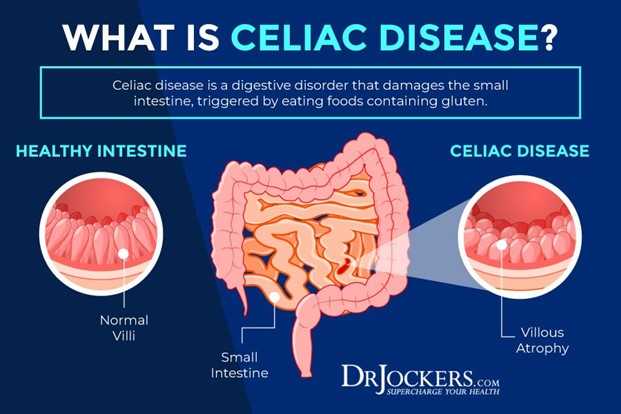A student nurse correctly explains the pathophysiology of celiac when it is stated that patients who have celiac disease:
"Have additional receptors in the colon that prevents transfer of the disease to others”
"Do not have blood pressures within normal limits when the small bowel encounters salt products."
"Have an increased risk of aspiration with the additional mucus produced in the small bowel”
"Do not have proper absorption of nutrients when the small bowel encounters the protein gluten.”
The Correct Answer is D
Celiac disease is an autoimmune disorder characterized by an abnormal immune response to gluten, a protein found in wheat, barley, and rye. When individuals with celiac disease consume gluten, their immune system reacts by damaging the lining of the small intestine, specifically the villi. The damaged villi are unable to effectively absorb nutrients from food, leading to malabsorption and a variety of symptoms.

Nursing Test Bank
Naxlex Comprehensive Predictor Exams
Related Questions
Correct Answer is A
Explanation
After spinal fusion surgery, it is important to limit the patient's activity and movement to allow for proper healing and to prevent complications. The order to have the patient out of bed three times daily and ad lib (as desired) is not appropriate immediately after surgery.
The other orders listed are appropriate for the postoperative care of a patient who has undergone spinal fusion surgery:
- Assess neurological status every 4 hours: This is important to monitor for any changes in neurological function, which could indicate complications such as nerve damage or spinal cord compression.
- Logroll only to change position: Logrolling is a technique used to move patients with spinal fusion surgery while keeping their spine aligned and minimizing stress on the surgical site. This order is appropriate to ensure proper positioning and prevent injury to the surgical area.
- Monitor vital signs every 4 hours: Monitoring vital signs helps to assess the patient's overall condition and detect any signs of complications such as bleeding or infection.
Correct Answer is A
Explanation
Glipizide is an oral antidiabetic medication commonly prescribed to manage type 2 diabetes. It works by stimulating the release of insulin from the pancreas, which helps lower blood glucose levels. However, there is a risk of hypoglycemia (low blood sugar) with the use of Glipizide.
It is crucial for the client to be aware of the signs and symptoms of hypoglycemia so that they can take appropriate action if their blood sugar drops too low. These symptoms may include sweating, trembling, dizziness, confusion, weakness, and hunger. By recognizing these signs, the client can promptly address hypoglycemia by consuming a source of fast-acting glucose, such as fruit juice or glucose tablets, as instructed by their healthcare provider.
Whether you are a student looking to ace your exams or a practicing nurse seeking to enhance your expertise , our nursing education contents will empower you with the confidence and competence to make a difference in the lives of patients and become a respected leader in the healthcare field.
Visit Naxlex, invest in your future and unlock endless possibilities with our unparalleled nursing education contents today
Report Wrong Answer on the Current Question
Do you disagree with the answer? If yes, what is your expected answer? Explain.
Kindly be descriptive with the issue you are facing.
